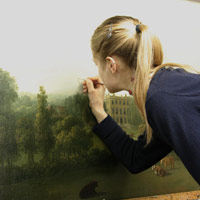The Hamilton Kerr Institute will be holding an Open Day for prospective MCEP students at its studio in central Cambridge on 23rd October 2025. Please email our Administrator before Monday 20th October to book a place or request further details: hki@fitzmuseum.cam.ac.uk
Course Overview:
The University of Cambridge, Master of the Conservation of Easel Paintings degree, is a full-time, three-year course, which provides students with a multi-disciplinary learning experience of the highest quality. Course content is delivered through a robust programme of academic teaching, combined with extensive, supervised, studio work. This qualification will provide you with excellent preparation for your professional career, building knowledge of conservation methods and heritage science, developing skills and a thorough understanding of scientific principles to inform professional and ethical decision making.
The Hamilton Kerr Institute (HKI) is part of the Fitzwilliam Museum, Cambridge University. The Faculty of Architecture and Art History, Cambridge University, is the awarding body for the degree. Next to training painting conservators, The HKI also offers an early-career trainee programme.
The HKI offers intense practical training via its conservation studio, taught by its professional conservation and heritage scientist team, based at both the HKI and the Fitzwilliam Museum. The team treats paintings from the Fitzwilliam museum’s collection and from other public institutions and private collections. Students are therefore fully immersed into a working studio. Because of this situation, unique to the HKI, the institute is internationally renowned for its expert, studio-based training in the field of easel painting conservation and alumni are employed in leading institutions, museums and galleries world-wide. For further details on student and intern destinations, please see the Careers Pathways section of this page.
HKI staff include ICON accredited conservators - leaders in their field, involved in research projects and some staff holding academic appointments which informs and enrich HKI teaching and learning. Studios and working spaces are shared with an average of 3 early career conservators, completing internships. This creates a uniquely valuable environment, where opportunities exist for academic discussion, sharing best practice, exploration of current developments within the conservation field, and involvement in research presentations.
The HKI and the Fitzwilliam Museum are also partners in the Cambridge Heritage Science Hub (CHeriSH), together with Cambridge University Library and the McDonald Institute for Archaeological Research, which together received over three million pounds of funding to invest in heritage science equipment. Through CHeriSH and the teaching on Heritage Science, which is part of the Master course, students and interns have access to the latest techniques and are able to to work with scientists in support of their research projects and conservation treatments. See: https://collectionsresearch.lib.cam.ac.uk/research-growth-networks/materiality/cambridge-heritage-science-hub-cherish
Qualification
HKI is privileged to be able to offer a high staff to student ratio which ensures a teaching and learning experience of the highest quality and there are a maximum of 4 places available on the Master course. Applicants considering undertaking the Master of Easel Painting Conservation qualification need a BA, or equivalent degree, in a subject related to the field of painting conservation, for example, History of Art, Fine Art, or Science. However, candidates with other specialisms will be considered if they are able to demonstrate aptitude for the field. Applicants need to have a minimum of a good upper second class (good 2:1) honours degree from a UK university, or an equivalent standard from an overseas university.
For more detailed information on the application process please navigate to the Application section of this page.
After graduation, students are expected to undertake at least a further year of study or Internship in a conservation department in Britain, or abroad, to gain further essential experience.

